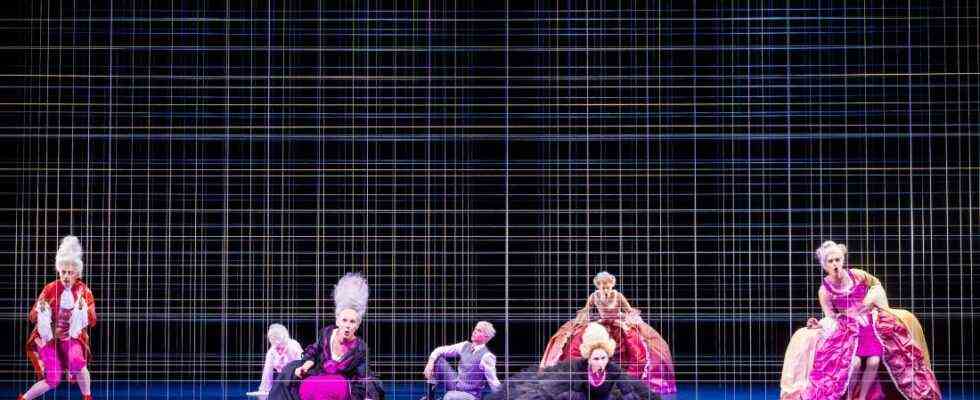“So how should the theater, which also sees itself in response to this as a theater for conflict-averse people, present its arguments and analyzes?” That asks Melanie Kretschmann, who is on the stage of the Düsseldorfer Schauspielhaus has been working very, very hard with six colleagues for almost two and a half hours to present arguments and analyzes. “Not like that,” murmurs a low voice in the audience.
Kretschmann will address a lot more, knock the audience on the ears. Merciless, as the author Rainald Goetz wrote down for pages as a “resolution” in the final monologue of his play “Reich of Death”. That it is fun to rule and ruin, that the art of performing is to show an ego, but at the same time want to have to hide it. The hall light will come on, the strings of the three-dimensional grid in which the whole evening took place will slacken, and this drum of words will continue to roll over the increasingly unwilling and restless audience.
This almost physically painful final performance, which demands a lot from the actress and the audience alike, is the appropriate climax and end point of a drama in which there is much talk of torture. 9/11 and Abu Ghraib form the historical background of the piece, with which Rainald Goetz reported back in 2020 after a long absence. And if you are attacking Donald Trump’s convulsions about the cruelty and idiocy of American politics with this work, omitting the Donald Trump convulsions that have taken place since then, and not entirely without consequences, then now is perhaps even a better time than when it was first performed a year ago : just in time for the humiliating withdrawal of western troops from Afghanistan, exactly 20 years after the terrorist destruction of the World Trade Center.
This coproduction between Düsseldorf and Cologne crosses the Alaaf-Helau border in an unusually forgiving way
Stefan Bachmann, artistic director of the Schauspiel Köln, took his streamlined version of “Reich des Todes” as an occasion for an unheard of conciliatory gesture by Rhenish standards: The Swiss production is the first official co-production between his company and the Schauspielhaus Düsseldorf; the Cologne premiere will follow on October 30th. This is quite remarkable in view of the not always fun competition between the two cities. But if you’ve had to live with a makeshift solution like the Cologne-based company for years, then the mere prospect of being able to play in the exemplary refurbished Düsseldorf house should make the step across the Alaaf-Helau border much easier.
The strings that the set designer Olaf Altmann stretched as a grid down to the depths of the stage are a rigid, three-dimensional world scheme in which the actresses – in addition to Melanie Kretschmann, these are Cathleen Baumann, Sophia Burtscher, Rosa Enskat, Claudia Hübbecker, Sabine Waibel and Ines Marie Westernströer – take turns in the roles of the Bush Cabinet after the New York attacks, the American torturers and their Iraqi victims. Goetz gave the characters – Rumsfeld, Wolfowitz, Rice – the names of German historical figures and repeatedly draws parallels between the uninhibited violence of the Americans and that of the Nazis. This has not become any less striking since the Hamburg premiere of Karin Beier, and here and there Bachmann goes optically in full with Sado-Maso-Lack-SS uniforms. The roaring officers slam each other off as if a horror installation by the artist brothers Jake and Dinos Chapman had come to life.
A piece of torture must hurt too. Scene with Claudia Hübbecker, Cathleen Baumann, Sophia Burtscher, Sabine Waibel, Ines Marie Westernströer and Rosa Enskat.
(Photo: Thomas Rabsch)
Incidentally, the fact that it is a purely female cast makes no noticeable difference. Whether in pinstripe suits, rococo costumes or Nazi outfits: the characters are largely depersonalized by rhythmic speaking in Super Presto four-four time – accompanied by a four-person ensemble of musicians who implement Sven Kaiser’s soundtrack as an insistent wall of sound, just as relentless as Goetz’s incessant one Text cascades. There is a lot of aggressively silly involved, such as the stupid puns about “Morgenlage” and “Morgenlatte” with which the President amuses himself after his morning prayers.
The cruelty of the meticulously described torture scenarios to which Iraqi prisoners were subjected in Abu Ghraib appears alternately to be cushioned and intensified. But when the tortured themselves come up for discussion, it turns out once again that silence and concentration on a stage have the greatest effect when in doubt. “What is the most terrible thing for us, almost more terrible than the actual physical agony that they do to us, is our fear of them,” says Sabine Waibel, crouched under a chair, without any background music. “What’s so funny about seeing others suffer? Doing others hurt, what’s the joke?” Then there is a short rest.
But not for long. Because the principle of the text and the production of Bachmann is that of overwhelming. A targeted overstrain of the viewer through language, noise and unpredictability. Until the monstrous final monologue, the end of which one longs for, and which one cannot deny the applause after all.

